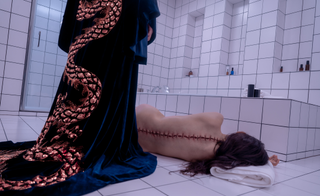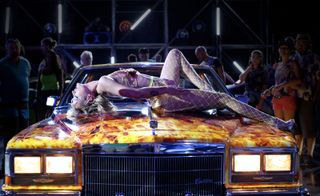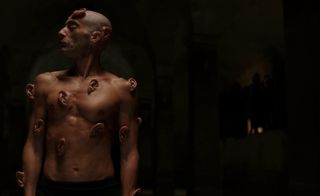The Substance may be grotesque, but it is not body horror
The Substance, Coralie Fargeat's sophomore feature film, has already been granted the moniker body horror, due its visceral imagery and mutations of the body

Elisabeth Sparkles (Demi Moore) has just turned 50 when she is fired from her hosting job by the producer (Dennis Quaid) of a televised aerobics show. Elisabeth, like so many aging stars before her, is being forced into obscurity by a shallow industry that refuses to look past her aging body. But for the rich and famous there is always another option. Elisabeth is offered a new piece of biotechnology, which allows her to live out her youth once more. Or at least split herself in two and share her life with a younger model who can live the life she is being denied. And so begins The Substance, Coralie Fargeat's sophomore feature film, that has already been granted the moniker body horror, due its visceral imagery and mutations of the body.

Still from The Substance
After Elisabeth injects the neon green liquid, she convulses on the bathroom floor, from her splitting spine emerges her younger self, Sue (Margaret Qualley). Wet with bodily fluids she stands in front of the mirror and marvels at her supple flesh, her perky bottom, her full lips. Here is where Coralie Fargeat’s problem begins, although her intention is to critique the ageism of the industry, she forgets that the camera holds no irony. What follows are many lingering shots of Sue, where her body is ogled by the camera. In one scene Sue wears a tight leather catsuit and Margaret Qualley’s curves balloon like a Jeff Koons, under an objectifying lens. While Elisabeth – despite Demi Moore’s obvious beauty – only receives cold hard angles.

Still from The Substance
The Substance may be a grotesque piece of horror, but not every gory addition to the genre falls into the category of body horror. When, inevitably, Sue abuses the substance, repercussions are visible on Elisabeth’s body: her finger bulges and wrinkles beyond her years. Repulsed by the crone-like appendage she scrubs desperately at the digit hoping to return her hand to its former glory.
In body horror, discomfort around the body is a prerequisite: Adrien (Agathe Rouselle) denies her half-human half-car pregnancy even as her stomach swells (Titane, 2021), Saul Tenser (Viggo Mortensen) struggles to accept the new organ growing inside him struggling against his own rapid evolution (Crimes of the Future, 2022) and body swapping assassin Tasya Vos (Andrea Risebourgh) reckons with the split from her physicality while revelling in the sexual pleasure of the Colin’s body (Christopher Abbott) that she inhabits (Possessor, 2020). Suffice to say alongside the dysmorphic horror they all experience, there are moments of sensual pleasure at their changing physicality. One which queries gender limitations and offers visceral and erotic possibilities, beyond the binary. But for Elisabeth, there is no revelry, only disgust, having internalised the misogyny of her industry.

Still from Titane, ©Carole_Bethuel
Body horror is much more than just manipulated gore designed to evoke disgust, in fact it contains a curiosity about the body that differs from horror's usual rubbernecking. Despite attempts at a critique on ageism, Fargeat’s abject treatment of the body and reliance on hagsploitation clichés, alongside a lack of interiority for Elisabeth or Sue – who spend their days in front of the TV or seeking male attention – makes for a vacuous depiction of womanhood.
The Substance should be stripped of the body horror title so many have awarded the film, as it lacks the fascination with what lies beneath the flesh. Thanks to body horror's long history of in depth experimentation with physicality, we have come to expect a committed questioning of gender that is exactly what The Substance lacks. It is merely a vacuous depiction of Hollywood that only succeeds in replicating stereotypes it claims to question.
The Substance is out now and at cinemas nationwide
Wallpaper* Newsletter
Receive our daily digest of inspiration, escapism and design stories from around the world direct to your inbox.

Still from Crimes of the Future
Billie is a London based culture and lifestyle writer. Her work on film, literature, internet culture and sexuality can be found in Dazed, Guardian, Little White Lies, Them and many more.
-
 Hill House Montecito is a flowing home 'for the twenty-first century'
Hill House Montecito is a flowing home 'for the twenty-first century'Hill House Montecito by Donaldson + Partners brings together a client's vision with architectural drama and a site-specific approach for a California family home
By Ellie Stathaki Published
-
 The Brecon raises the bar for contemporary chalet chic
The Brecon raises the bar for contemporary chalet chicDesigned by Amsterdam studio Nicemakers, The Brecon sports a contemporary Swiss chalet aesthetic with midcentury echoes
By Laura May Todd Published
-
 Shigeru Ban wins 2024 Praemium Imperiale Architecture Award
Shigeru Ban wins 2024 Praemium Imperiale Architecture AwardThe 2024 Praemium Imperiale Architecture Award goes to Japanese architect Shigeru Ban
By Ellie Stathaki Published
-
 New film, Hollywoodgate, finds out what really happened when the US left Afghanistan
New film, Hollywoodgate, finds out what really happened when the US left AfghanistanFilmmaker Ibrahim Nash’at’s Hollywoodgate follows Taliban soldier MJ Mukhtar and air force commander Mawlawi Mansour in the aftermath of America’s withdrawal in August 2021
By Zoe Whitfield Published
-
 Toys, fantasy and the US immigration system: inside Julio Torres' debut film, Problemista
Toys, fantasy and the US immigration system: inside Julio Torres' debut film, ProblemistaJulio Torres writes, directs and stars in Problemista – now on digital release – where the nightmare of US immigration is given a surreal spin
By Hannah Silver Published
-
 First Fraenkel Film Festival in San Francisco: what to see
First Fraenkel Film Festival in San Francisco: what to seeThe Fraenkel Film Festival, at the Roxie Theater in San Francisco, sees ten Fraenkel gallery artists choose films that impact their work
By Lauren Cochrane Published
-
 Paul B. Preciado on his Orlando film: 'There is no trans question'
Paul B. Preciado on his Orlando film: 'There is no trans question'Paul B. Preciado interprets Virginia Woolf’s work in 'Orlando, My Political Biography'
By Sam Moore Published
-
 Enter the immersive world of film noir at a disused hospital in Venice
Enter the immersive world of film noir at a disused hospital in VeniceFondazione In Between Art Film returns to Venice with ‘Nebula’, by curators Alessandro Rabottini and Leonardo Bigazzi
By Amah-Rose Abrams Published
-
 Cannes Film Festival 2024 highlights: our verdict is in
Cannes Film Festival 2024 highlights: our verdict is inWhat to watch or not to watch – cut to the Cannes Film Festival 2024 highlights
By Sophie Monks Kaufman Published
-
 Cyber-noia, pornography, and liberation: inside the queer sci-fi of Shu Lea Cheang
Cyber-noia, pornography, and liberation: inside the queer sci-fi of Shu Lea CheangShu Lea Cheang's new film, ‘UKI’, exists in two worlds simultaneously: the real world of flesh and blood, and a strange digital landscape
By Sam Moore Published
-
 ‘What a Fantastic Machine’: new film explores the camera, pop culture and human behaviour
‘What a Fantastic Machine’: new film explores the camera, pop culture and human behaviourMaximilien Van Aertryck and Axel Danielson’s new film, ‘And the King Said, What a Fantastic Machine’, dissects the role of the camera in popular culture
By Zoe Whitfield Published